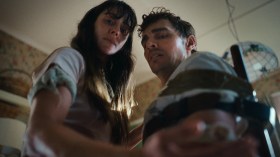Dementia. It’s a sobering prospect and likely to affect us all in one way or another, whether it’s as a carer, family member or sufferer.
But going to the cinema and enjoying the big-screen experience shouldn’t be one of the things we have to forgo, according to organisers of ‘A Day at the Movies’, an innovative three-year program of dementia-friendly film screenings at the National Film and Sound Archive of Australia (NFSA) in Canberra.
The first program of its kind in Australia, ‘A Day at the Movies’ will launch at the NFSA during Dementia Action Week (16-22 September), opening with the much-loved Australian classic Strictly Ballroom (1992). The launch follows several years of research, extensive community consultation, and a successful 2022 pilot that aims to keep people engaged with the big-screen experience.
An initiative of the ACT Government, the program is part of an Age-Friendly City Plan and has support from the NFSA, Carers ACT, Dementia Australia and the ACT Ministerial Advisory Council on Ageing.
According to Associate Professor Cathy Hope, Chair of the ACT Ministerial Advisory Council on Ageing, ‘There are approximately 5,900 people currently living with dementia in the ACT, with that figure expected to increase to 12,300 by 2058.
‘With the acceleration of dementia and early onset dementia diagnosis across our population,’ Professor Hope says, ‘community-based recreational spaces for people living with dementia are just as important as ‘mums and bubs’ sessions currently available in mainstream cinemas.’
Led by UNSW film academic Dr Jodi Brooks, the research team behind the dementia-friendly screenings program includes University of New England screen and media academic Dr Fincina Hopgood, and independent screen culture and audience development specialist Karina Libbey.
Dr Brooks, a film studies scholar with a special interest in ‘aging in, on and with cinema’, says: ‘People living with dementia often experience social isolation and discrimination. While these screenings are open to everyone, they are specifically tailored for the enjoyment of people with dementia.’
Brooks says the program enables people living with dementia to continue to enjoy cinema with their friends and family, and will help foster a more inclusive Australian screen culture in general.
ScreenHub: Challenges facing those with disability in the screen industry
What is a dementia-friendly screening?
According to the announcement, dementia-friendly screening principles implemented around the screening program will include:
- matinee timing (no 9pm start times!)
- low level house lighting that enables people to move around if need be
- slightly lower volume levels
- additional wayfinding and information signage at the cinema
- free tickets for accompanying carers.
- social opportunities after the screening
As Dr Fincina Hopgood explained to ScreenHub, ‘Fundamentally, the principles in designing dementia-friendly screenings are about removing the physical and social barriers to cinema-going – rethinking both the physical and social spaces we create in the movie theatre and cinema environment – so that accessibility and inclusion for everyone, regardless of age and ability, are built into the movie-going experience.’
Accessibility is also a good thing for cinema proprietors, says Hoppgood. ‘Anything that gets more people going to the movies benefits cinemas also!’
Why are Dementia-friendly screenings a new thing in Australia?
Brooks told ScreenHub that while the NFSA initiative is a first in Australia, dementia-friendly screenings have been a regular part of UK cinema culture since 2017, with taround 400 theatres across the UK offering dementia-friendly screenings.
Looking for something similar in Australia, Brooks was intrigued as to why our screen culture has been lagging behind in this particular area of inclusivity, saying that our focus here, and our industry initiatives to increase inclusivity, seem to have focused more on what’s on screen, and behind the camera, rather than on the audience – those who are consuming and enjoying it.
Brooks says: ‘I think this is partly to do with where dementia is “located” in our various categories (it sits at the intersection of ageing, disability and mental health, which is perhaps why it is also “missed” in cinema initiatives in each of those areas).
‘But it is also to do with how a lot of the discussion around disability and inclusion in Australian screen culture has focused around on-screen representation and behind the camera participation.’
The advantage in coming late to the dementia-friendly screening party, according to Brooks, is that we get to learn from our overseas counterparts and see what works well and what doesn’t.
‘That includes getting a good sense of what’s needed to make programs like this reach the audiences that they should (recognising the rich diversity of people living with dementia) and what is required to make these kinds of screenings sustainable.’
‘While we draw strongly on the UK initiative, we’ve also introduced a few things into the design of our program that we are particularly excited by and see as a way to extend the reach of the program, build program sustainability, and increase community understanding of dementia.’
Why Strictly Ballroom?
The three-year ‘Day at the Movies’ program will include nine screenings, with yet-to-be announced films including Australian musicals and Hollywood classics, more recent comedy, drama, and perhaps even a cult film or two.
As to why Strictly Ballroom has been chosen to launch the initiative, Hopgood says: ‘Many people have such affection for and fond memories of this popular Australian film, which recently celebrated its 30th anniversary at the Cannes Film Festival where they screened a 35mm print restored by the NFSA through the NFSA Restores program.
‘As a musical comedy, Strictly Ballroom combines colour, movement, romance and humour with nostalgic pop songs from the 70s and 80s and classical story elements like putting on a show and finding your true self through performance. The film has tremendous appeal across generations, making it an ideal choice for a family movie matinee.’
The dementia-friendly and accessible screenings wishlist
We asked the research team behind the dementia-friendly program to name three things on their wishlist to make cinema events more accessible in general. Here’s what they said:
Dr Fincina Hopgood: Some of my fondest childhood memories are going to the movies with my dad, who was an actor and scriptwriter. But even he used to complain ‘why do they have to make it so loud?’ So that would be number one on my list: find ways to reduce the volume in cinema speakers and create a listening experience that doesn’t assault the senses while still respecting the sound design that the filmmakers have worked so hard to create.
Karina Libbey: Staff training and awareness is critical to increasing accessibility. Ensuring that front of house staff are confident and understand how to engage with people with a range of access needs makes a world of difference to that person’s experience.
Dr Jodi Brooks: Broader understanding, prioritising, and resourcing of the range of elements that can make a cinema screening accessible and inclusive, from scheduling to assistive technologies, from wayfinding signage and theatre layout to event promotion. We don’t think about the audience enough when we talk about accessibility, diversity and inclusion in Australian screen culture.
The recent report on disability and screen work in Australia (O’Meara R, Dunstan L, Ryan C, and Debinski A 2023, Disability and Screen Work in Australia: Report for Industry, Melbourne Disability Institute) has done really important work examining the various barriers faced by disabled people working in the Australian screen industry, and Screen Australia’s Seeing Ourselves 2 has tracked on-screen diversity in recent productions and found that despite some progress in disability representation, disability representation remains ‘critically low’ in Australian screen drama.
When we think about Australian screen culture, we tend to think about what’s on screen and who is behind the camera and forget about the other crucial aspects of a screen culture – cinema-going, film viewing, festivals, enjoying cinema – and who is included, welcomed and valued in that. I’d like to see us prioritise accessibility and inclusion as valuable – critical – aspects of audience development.
I’d like to see us have something like the BFI Film Audience Network (BFI FAN), which aims to ensure that the greatest choice of film is available for everyone across the whole of the UK.
A Day at the Movies: Strictly Ballroom will screen on Sat 21 September at the Arc Cinema in Canberra. Find out more at the NFSA.





